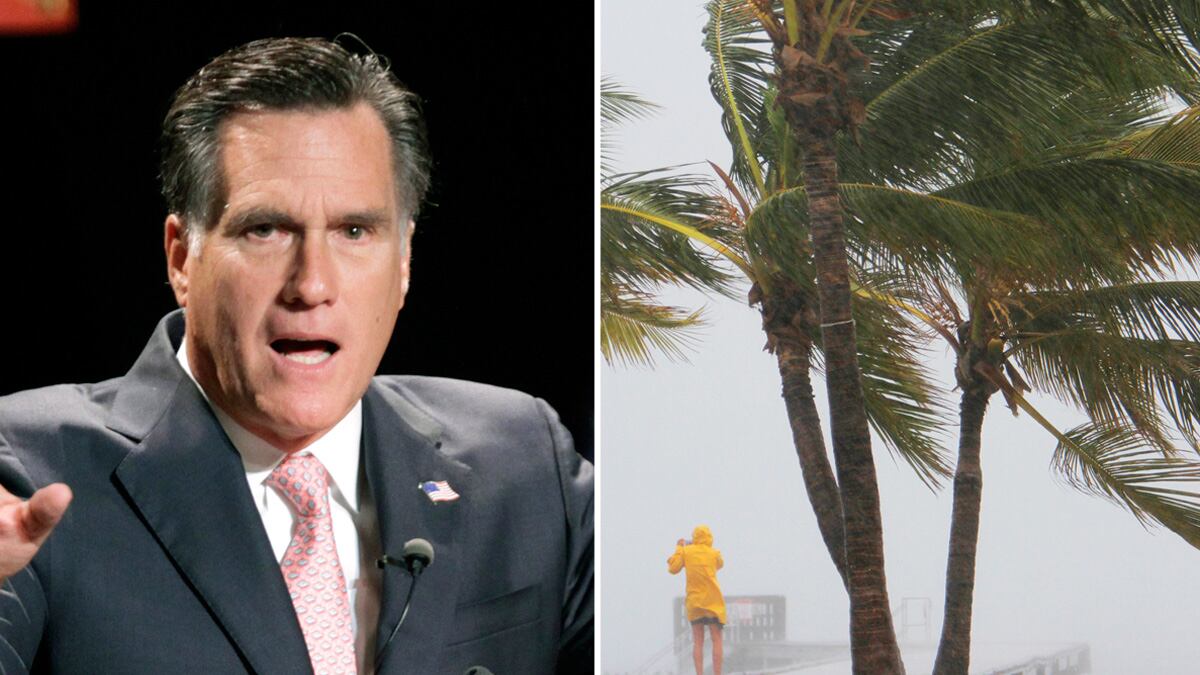TAMPA—Michael Steele was playing the odds as Republican Party chairman, signing off on a decision to hold the 2012 convention here on Florida’s west coast at the start of hurricane season.

It was a high-stakes gamble that dissolved in the wind and rain. But even as Tropical Storm Isaac has ruined the kickoff of Mitt Romney’s big event, forcing the cancelation of the first day and potentially overshadowing the rest of the convention, Steele is unrepentant. He defended the decision with his usual bravado, turning the question back on his detractors.
“They’re small-minded and stupid,” he told me. “It’s just silly for them to blame one person for a decision made by 160 people. We were excited about coming here, knowing there was the potential to have a storm like this. It’s amusing to me that folks are looking for an excuse to blame someone for a storm.”
Steele had initially framed the process in historical terms, saying he made the decision based on careful research and would do it again. Why, a hurricane hadn’t hit Tampa the last week in August in 100 years, he said.
Steele used somewhat saltier language about his critics with Politico.
“They just need to stop that shit, OK, get over it,” Steele said. “First off, they act like I did nothing for two years and then something they don’t like, I did it all.”
Steele was a controversial chairman during his two-year term, to say the least, often making colorful or in-your-face comments that set off internal sniping and finger-pointing. But it’s true that he didn’t single-handedly roll the dice on Tampa.
The party’s site-selection committee approved the Tampa pick, a decision ratified by the full RNC. Steele didn’t have a formal vote, but he agreed with the decision.
This city’s top newspaper called it a “nightmare scenario,” but dismissed the odds as “mercifully slim.”
In fairness, it’s not like the party’s move in anointing Tampa over Phoenix and Salt Lake City was widely assailed at the time. The New York Times, in a story on the choice, devoted half a sentence to the threat of extreme weather, noting that “convention season is also hurricane season.”
Last spring, the Tampa Bay Times reported the chances that a hurricane would disrupt the long-planned Republican convention were less than 1 percent.
In purely political terms, it’s not hard to see the appeal. The Tampa–St. Petersburg area is a politically independent region in perhaps the country’s most important swing state. Four days of saturation coverage in the state that decided the deadlocked 2000 election could only boost the Republican nominee’s chances.
And then the weather intervened.
It remains to be seen how much of the convention is washed away by the tropical storm that passed through Tampa. The threat of a hurricane has dominated the media coverage so far, relegating Romney to the sidelines.
The danger is that this week in Tampa will be remembered for Isaac, not Mitt, costing the GOP nominee millions of dollars in free publicity and an unparalleled chance to capture the nation’s attention.
The notion of a possible hurricane in South Florida in late August was not exactly a state secret. Steele and the RNC chose to ignore that possibility at their peril.
For his part, though, Steele says the convention would have been overshadowed by the storm no matter where the gathering was held. He noted how the GOP had to cancel the first day of its 2008 convention in St. Paul, Minn., out of sympathy with victims of a hurricane in Florida.
Clearly, he’s not someone who loses a lot of sleep over past actions.
“I don’t give a damn who likes me or who doesn’t like me,” Steele says. “This isn’t about me.”






